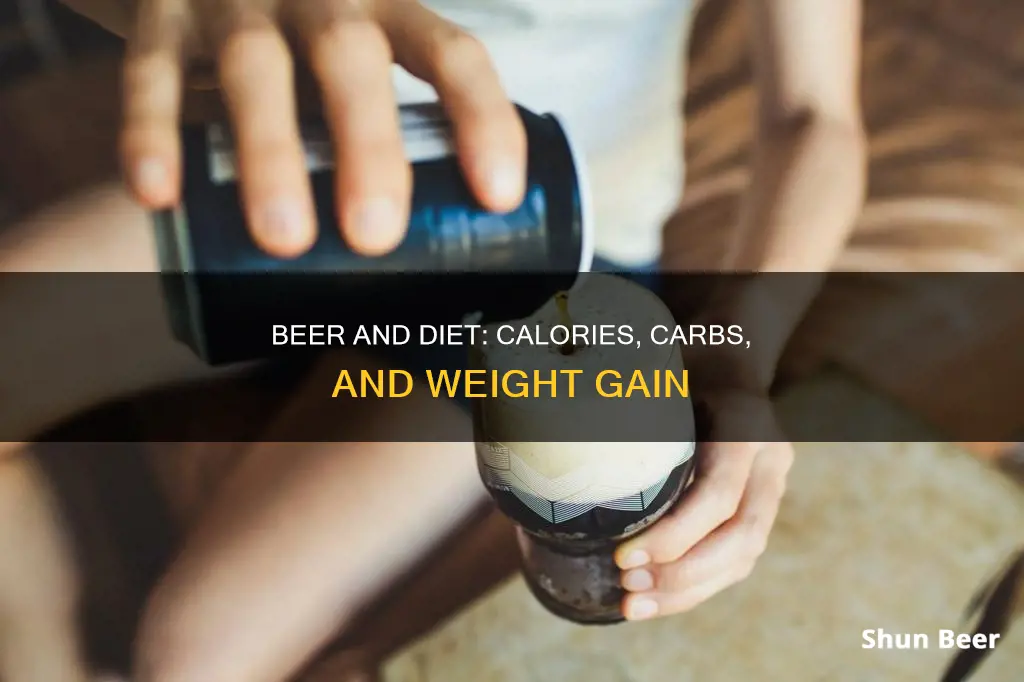
Beer is a popular alcoholic drink, but what does drinking it do to your diet? Beer is often viewed as empty calories, but it does contain some vitamins and minerals. Drinking one or two standard beers per day may have some health benefits, such as improving blood sugar control and lowering the risk of heart disease, dementia and bone issues. However, beer is also associated with negative side effects, including weight gain, liver disease, cancer and an increased risk of early death. So, while moderate consumption may offer some benefits, heavy or binge drinking is likely to be harmful.
What You'll Learn

Beer and weight loss
Beer is often viewed as a contributor to weight gain, especially around the belly area. However, it is important to note that any excess calories, regardless of their source, can lead to increased belly fat. While beer is not solely responsible for the infamous "beer belly", it does contain calories that can contribute to overall calorie intake and make it challenging to manage weight.
A typical beer contains approximately 150-153 calories, and consuming multiple beers in one sitting can result in a significant calorie overload. Additionally, alcohol can increase appetite and is often accompanied by high-calorie bar snacks or meals, such as pizza, wings, and fried foods. This can further increase overall calorie intake, making it more difficult to maintain a calorie deficit, which is crucial for weight loss.
To incorporate beer into a weight-loss plan, it is recommended to opt for light or low-percentage alcohol by volume (ABV) beers, as these have fewer calories. Reducing portion sizes by using smaller glasses or choosing cans instead of bottles can also help decrease calorie intake. Drinking less frequently, such as only on weekends, and choosing lower-carb beers are other strategies to consider.
It is worth noting that while moderate drinking is generally defined as 1-2 drinks per day for men and up to one drink per day for women, beer enthusiasts aiming for weight loss may need to further reduce their consumption to create a significant calorie deficit. Additionally, heavy alcohol intake can have negative health consequences, including an increased risk of liver disease, weight gain, and cancers.
In conclusion, while it is possible to include beer in a weight-loss plan, it requires careful consideration of calorie intake, portion sizes, and drinking frequency. Combining beer consumption with a healthy diet and regular physical activity will help ensure a balanced approach to weight loss and overall well-being.
Megan's Beer-Drinking Habits: A Curious Exploration
You may want to see also

Beer and bone density
A clinical study found that moderate beer consumption was associated with increased bone density and strength, which may be due to several factors. Beer is a rich source of silicon, a micronutrient that may help prevent bone loss and osteoporosis. The silicon content in beer varies, with pale ales having the highest levels and non-alcoholic beers the lowest. The University of California reported that beer can contain anywhere from 6.4 to 56.5 mg of silicon per liter.
The relationship between beer and bone density may also be influenced by other factors. One study suggested that the positive effect of moderate alcohol consumption on bone density was more pronounced in postmenopausal women, possibly due to the impact of alcohol on estrogen levels. Additionally, the type of alcoholic beverage may play a role, with beer and wine showing stronger associations with bone density than liquor, indicating that constituents other than ethanol may contribute to bone health.
However, it is important to note that the research on alcohol and bone health is mixed, with some studies suggesting a positive relationship between alcohol consumption and osteoporosis. The variability in results may be due to the challenging nature of studying alcohol, including the reliance on self-reported data and the long-term nature of any potential effects.
In conclusion, while moderate beer consumption may have some benefits for bone density, it is important to consume alcohol in moderation as excessive intake can lead to negative health outcomes, including bone loss.
Craft Beer and Sushi: The Perfect Pairing
You may want to see also

Beer and sleep quality
Beer and other alcoholic drinks can have a significant impact on sleep quality. While alcohol may help you fall asleep faster, it ultimately has a negative impact on sleep. Even in moderate amounts, alcohol consumed in the hours before bedtime can lead to a night of fragmented sleep, leaving you feeling tired the next day.
Alcohol affects your sleep architecture, which is how your body cycles through the four stages of sleep. The typical sleep cycle begins with three non-rapid eye movement (NREM) stages of sleep and ends with rapid eye movement (REM) sleep. During sleep, the body cycles through all of these stages every 90 to 120 minutes, with NREM sleep dominating the first part of the night and REM sleep increasing during the second part. Each stage is necessary for sleep to be refreshing and for vital processes like learning and memory consolidation to occur.
When you go to bed with alcohol in your system, you are likely to experience more N3 sleep, or "deep sleep", and less REM sleep. Later in the night, once your body has metabolised the alcohol, you are likely to experience a rise in N1 sleep, the lightest stage of sleep, which can lead to frequent wakings and fragmented, low-quality sleep. Alcohol also inhibits REM sleep, which is often considered the most mentally restorative phase of sleep.
In addition to altering your sleep architecture, alcohol can also disrupt your sleep by interfering with circadian rhythms and contributing to sleep disorders such as sleep apnea. Alcohol can cause physiological changes that affect people with obstructive sleep apnea (OSA), which occurs when tissues in the nose or throat collapse and temporarily obstruct the airway. Alcohol causes tongue and throat muscles to relax and leads to changes in blood vessels in the nose, resulting in greater airway resistance in the nasal passages. These alterations significantly increase the likelihood and duration of breathing events during sleep.
Alcohol can also affect people with central sleep apnea (CSA), which occurs when the brain periodically stops sending certain signals involved in breathing. Alcohol interferes with the brain's ability to receive chemical messages involved in breathing, decreasing the body's respiratory drive and increasing the likelihood of pauses in breathing.
Heavy alcohol use can also contribute to the development of insomnia, and insomnia is also common in people who are in withdrawal or early recovery from alcohol addiction. While heavy alcohol use can trigger insomnia, the opposite is also true: people with insomnia have an increased risk of developing alcohol use disorder, possibly because many individuals turn to alcohol as a sleep aid.
To minimise the impact of alcohol on your sleep, experts recommend avoiding alcohol at least three hours before bed. Drinking water along with alcohol can also help to flush it out of your system. It's also a good idea to drink alcohol while eating a meal, as this can help to keep your drinking in check.
Beer and Aleve: Safe Mix or Health Risk?
You may want to see also

Beer and gut health
Beer has a reputation for causing weight gain, particularly around the belly, but is this really true? While beer contains calories, and excess calorie intake can lead to increased belly fat, other factors also come into play.
Calories and Metabolism
Beer typically contains around 150 calories per serving, and it's easy to consume several servings in one sitting, resulting in a significant calorie overload. Alcohol calories are particularly easy to overdo as they are simple to consume and don't fill you up like food. Additionally, alcohol intake can increase your appetite, and the foods typically consumed with beer, such as pizza, wings, and fried foods, tend to be high in calories and fat.
When you consume more calories than you burn, the excess is stored as fat. The location of this fat deposition is influenced by factors such as age, sex, and hormones. Men tend to store more fat in their bellies due to having less subcutaneous fat, while women tend to store it in their arms, thighs, and buttocks, as well as their bellies.
Alcohol's Role
Alcohol also plays a specific role in fat accumulation. When you drink alcohol, your liver burns alcohol instead of fat, which can lead to an increase in waist size and central body fat. Heavy alcohol intake can also influence metabolism, leading to elevated blood sugar, blood pressure, and cholesterol levels, and increased fat storage.
Beer's Place in a Healthy Diet
So, does this mean you have to give up beer completely to maintain a healthy weight and gut? Not necessarily. Beer can be included in a weight-loss plan if consumed in moderation. Light beers with 100 calories or less are a better option, and drinking in moderation (one drink per day for women and up to two drinks per day for men) is recommended.
Additionally, beer contains some nutrients, including B vitamins, potassium, calcium, thiamine, iron, and zinc, due to its production from cereal grains and yeast. However, the amount of these nutrients is small, and you would need to consume large amounts of beer to meet your daily requirements, which is not recommended due to the associated health risks.
In conclusion, while beer can contribute to gut health through its nutritional content and potential prebiotic properties, excessive consumption can lead to weight gain and increased belly fat. Moderation is key when it comes to including beer in a healthy diet and maintaining a healthy gut.
Israelites and Beer: A Historical Perspective
You may want to see also

Beer and diabetes
Beer is not strictly off-limits for diabetics, but there are some important considerations to keep in mind. Firstly, alcohol can interfere with your liver's ability to regulate blood sugar levels, leading to a condition called hypoglycaemia, or low blood sugar. This effect can last up to 24 hours after drinking, and it is made worse if you drink on an empty stomach. Therefore, it is important to eat before and while drinking, and to monitor your blood sugar levels closely.
Beer is typically higher in carbohydrates than other alcoholic drinks like wine or spirits. "Light" beers have the fewest carbs, usually 5 grams or less per serving, and are also lower in alcohol content. Hoppy craft beers like IPAs and stouts tend to be much higher in carbs, with 15 grams or more per serving, and they also tend to be higher in calories and alcohol content. So, if you're going to drink beer, it's best to stick to light beers and limit yourself to no more than one drink per hour and no more than three or four drinks per day.
Alcoholic drinks, including beer, can also be high in calories, which can lead to weight gain. This is a particular concern for people with diabetes, as being overweight increases the risk of developing type 2 diabetes. Additionally, alcohol can stimulate your appetite and affect your judgment, leading to overeating and making it more difficult to control your blood sugar and weight.
Excessive alcohol consumption can also lead to other health issues, such as increased blood pressure, nerve damage, dehydration, and disrupted sleep. It can also increase the risk of certain cancers and heart disease. Therefore, it is important for people with diabetes to drink in moderation and only when their blood sugar levels are well-managed. It is also a good idea to consult a doctor to understand how alcohol may interact with any medications you are taking.
Hindus and Beer: What's the Religious Stance?
You may want to see also
Frequently asked questions
Yes, but it is harder to create a caloric deficit if you drink every day. Beer can contribute a lot of calories, and it's difficult to determine which beers are high or low in calories as this information is not always readily available. To reduce calories, you can drink light or low % ABV beer, reduce your portion size, or drink less frequently.
It's not necessarily beer itself that causes a "beer belly", but too many calories. Any excess calories, whether from alcohol, sugary drinks, or large portions of food, can increase belly fat. However, alcohol does seem to have a particular association with fat in the midsection. Beer also contains a lot of calories, which are easy to overdo, and alcohol can increase your appetite.
Light to moderate beer intake may be associated with some health benefits, including a lower risk of heart disease, improved blood sugar control, stronger bones, and reduced dementia risk. Beer also contains some vitamins and minerals, such as B vitamins, potassium, calcium, and zinc. However, it is important to note that heavy and binge drinking can counter these potential benefits and increase the risk of various health issues, including weight gain, liver disease, and depression.







